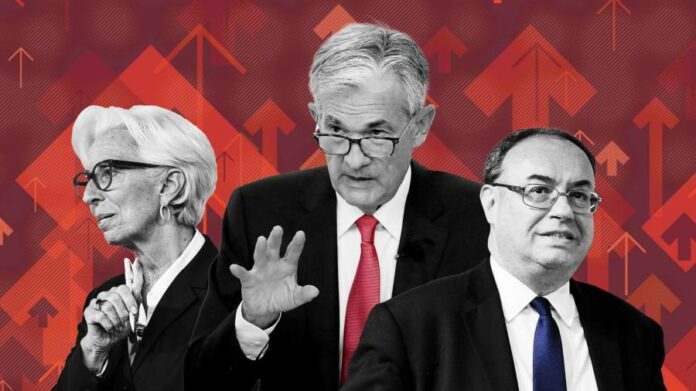This article is an on-site version of our Disrupted Times newsletter. Sign up here to get the newsletter sent straight to your inbox three times a week
Today’s top stories
For up-to-the-minute news updates, visit our live blog
Good evening,
Central banks on both sides of the Atlantic opened up a new phase in the battle against inflation this week, but at the expense of setting off a new bout of investor jitters on the outlook for the world economy.
The US Federal Reserve, European Central Bank and Bank of England all slowed the pace of interest rate rises, opting for 0.5 percentage point increases, but with a side order of hawkish comments.
Financial markets were left “awestruck” by the warnings that policy tightening was not yet over. “This is emerging market-type repricing post a central bank meeting, it’s wild,” said one strategist. Hopes for a Christmas rally have been dashed.
The Fed was first to move on Wednesday, relaxing its policy tightening after a series of 0.75 point increases, but also unveiling new projections that showed rates hitting a higher level than previously expected and staying there for an extended period. Growth will be slower and unemployment higher, it also suggested.
This was despite news the day before showing consumer prices rising at their slowest pace in a year, which had sent US shares and bonds surging. A top Fed official today reinforced the message that investors should not get too optimistic just yet, warning that rates could yet exceed the 5.1 per cent level forecast by most policymakers.
The ECB followed suit on Thursday, raising rates to 2 per cent and warning of more rises to come, with the even more hawkish stance of ECB chief Christine Lagarde reflecting the stickier nature of inflation in the eurozone.
On the same day, the BoE increased rates to 3.5 per cent, the highest level in 14 years. BoE governor Andrew Bailey said a tight labour market and rises in wages and prices justified a “further forceful monetary police response”.
There were also increases in Switzerland, Norway, Mexico and the Philippines. Russia’s central bank held rates steady at 7.5 per cent after months of successive cuts from the emergency 20 per cent rate it set after the invasion of Ukraine in February.
Although factors such as falling inflation and smaller US rate rises may give hope to emerging markets, the overall message from developed economies is clear: the battle against price and wage rises is not yet complete.
Need to know: UK and Europe economy
The PMI reading for the eurozone was more hopeful than the UK’s, bringing more signs that the coming recession would be milder than initially feared.
Russian crude oil is being shipped to India on tankers insured by western companies, in the first sign that Moscow has gone back on its vow to block sales under the G7-imposed price cap.
The second Big Read in our series on Russia’s beleaguered economy examines the fate of the technocrats. Once seen as modernisers and a counterbalance to Putin’s hardline security service veterans, they have seen their influence diminish and failed to speak out against the war. The US has imposed sanctions on Vladimir Potanin, the nickel tycoon and one of Russia’s wealthiest oligarchs.
Need to know: Global economy
Despite pledges at UN climate talks, global coal use will reach a record level this year and stay high until 2024 because of the war in Ukraine and rising demand in India and China.
New Zealand’s economy grew by a “whopping” 2 per cent in the three months to September — double the amount expected — thanks to a rebound in construction, services and tourism when the country reopened its borders. Some see the growth as vindication of the central bank’s ultra-hawkish stance to tackle inflation.
Peru is in a 30-day state of emergency as its fragile interim government tries to quell protests that erupted after former president Pedro Castillo’s failed attempt last week to seize extraordinary powers.
Homecoming, the new book from FT columnist Rana Foroohar, offers a prescription for the “post-global era that listens less to the interests of Wall Street and more to the interests of ‘people and place’”. Read the review.
Need to know: business
The US has put another 36 Chinese companies on its trade blacklist aimed at slowing Beijing’s development of advanced microchips and technologies that could be used for military purposes. For more on the chip wars, see Wednesday’s DT.
The mobile games market is set to decline this year for the first time since the advent of smartphones because of rising advertisement costs, a drop in consumer spending and the end of the pandemic-driven boost in game-playing. The era was kick-started with the introduction of Apple’s App Store in 2008, eventually turning into a $100bn market accounting for half the gaming industry’s total revenues.
Spare a thought for the bankers this Christmas. Wall Street is bracing itself for big cuts to bonuses after a terrible year, with Goldman Sachs both cutting its payouts by at least 40 per cent and its headcount by almost 4,000 people.
Science round-up
US scientists have achieved the first energy gain in a nuclear fusion reaction. Tom Wilson explains what fusion is and how close we are to zero-carbon fuel.
Genomics England, a UK government owned company, will fully decode the DNA of 100,000 newborn babies. The £105mn research programme aims to extend the number of treatable rare genetic conditions to 200.
CSL’s $3.5mn single-dose treatment for haemophilia B, Hemgenix, has sparked debate over how to pay for revolutionary drugs.
Moderna and Merck will launch the first phase 3 trial of a messenger RNA cancer vaccine, as recent data suggests that combining Moderna’s experimental cancer vaccine and Merck’s immunotherapy drug could treat melanoma.
British property company Canary Wharf Group has submitted plans to develop a £500mn tower block laboratory, as demand for office space falls. The 23-storey building would be among the largest labs in Europe.
Silence on the COP15 biodiversity talks, which started last week, is deadly, writes Gillian Tett. Species are disappearing at an alarming rate with catastrophic economic consequences.
Covid cases and vaccinations
Total global cases: 644.2mn
Total doses given: 13.1bn
Get the latest worldwide picture with our vaccine tracker
Some good news
Virgin Atlantic has announced the first transatlantic “net zero” flight. And in a further piece of good aviation news, the tiny toiletry era is almost over: UK airports are set to relax the rules on liquids and electronics inside cabin bags.
Something for the weekend
The FT Weekend interactive crossword will be published here on Saturday, but in the meantime why not have a go with today’s cryptic crossword?
Interactive crosswords on the FT app

Subscribers can now solve the FT’s Daily Cryptic, Polymath and FT Weekend crosswords on the iOS and Android apps
Thanks for reading Disrupted Times. If this newsletter has been forwarded to you, please sign up here to receive future issues. And please share your feedback with us at [email protected]. Thank you






